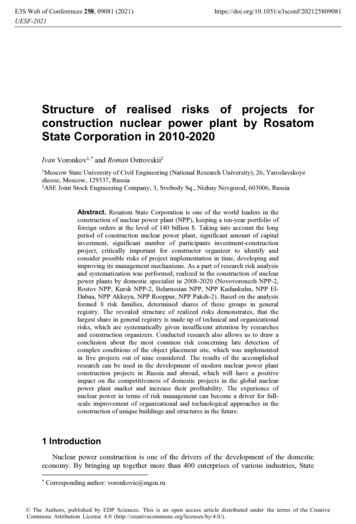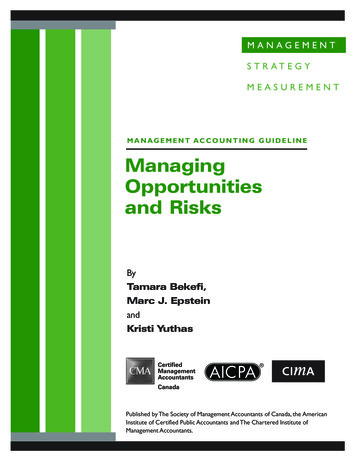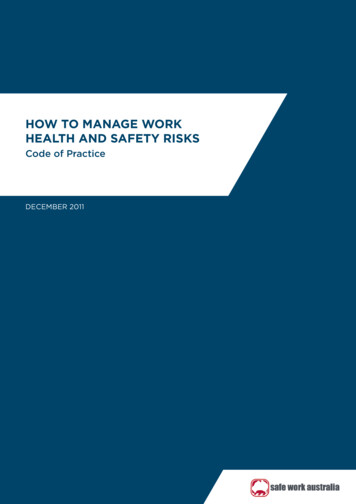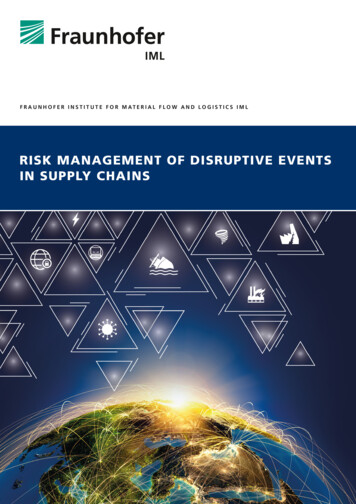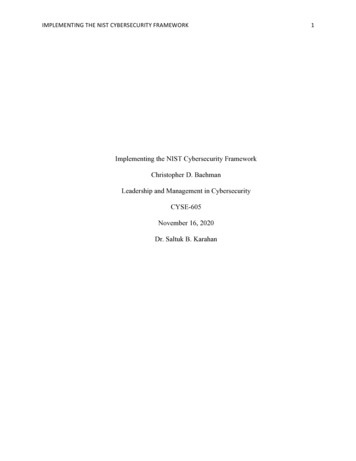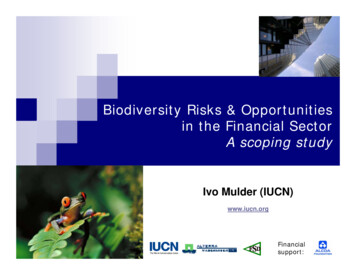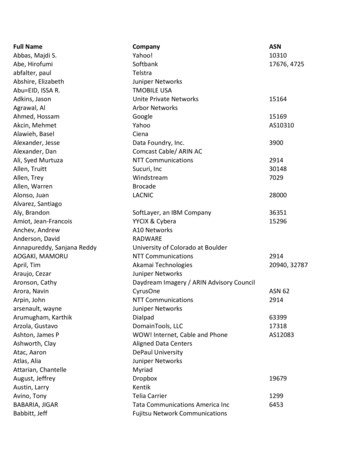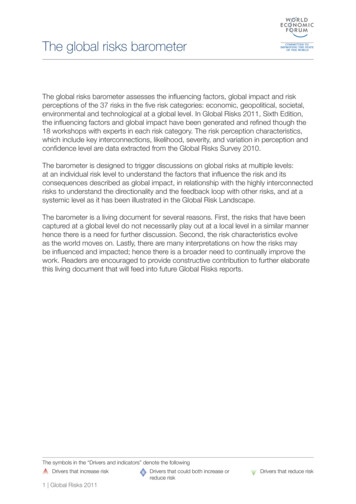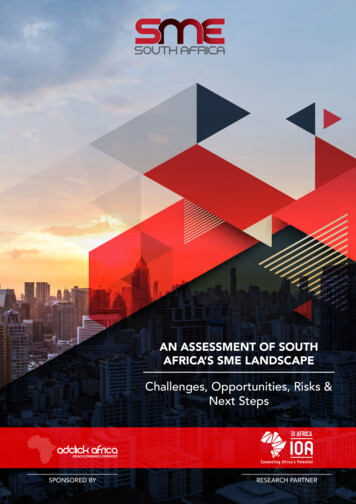
Transcription
AN ASSESSMENT OF SOUTHAFRICA’S SME LANDSCAPEChallenges, Opportunities, Risks &Next StepsSPONSORED BYRESEARCH PARTNER
Adclick Africa is one of South Africa’s fastest growing marketing agenciesoffering best in class digital solutions that drive revenue growth forbrands. Our unique results-based approach operates on real time inmarket audience data, dynamic technology, creativity and superiorservice delivery. Established in 2013 by Velly Bosega , the company alsoowns SME South Africa, a business unit that offers business content,data and B2B advertising services to brands.Adclick Africa is a level 1 BEE company that is accredited with the MediaRating Council (MRC), Interactive Advertising Bureau (IAB), MobileMarketing Association (MMA) of South Africa and Federated HospitalityAssociation of South Africa (FEDHASA). The company is headquarteredin Ferndale, Randburg.For more information kindly visitwww.adclickafrica.com Email: info@adclickafrica.com 011 704 2641.In On Africa (IOA) is one of the leading Africa-focused research,consulting and publishing firms, based in Africa and focused solelyon Africa. IOA was founded in 2007 and aims to ensure data-drivendecision-making through quality research and analysis. IOA offers awide range of services to help clients to better understand Africa and toaccelerate growth on the continent.For more information kindly visitwww.inonafrica.com Email: info@inonafrica.com 011 027 4027SME South Africa, a division of Adclick Africa, commissioned Africa-focused research consulting firmIn On Africa (IOA) to conduct a comprehensive assessment of the state of SMEs in South Africa, witha focus on the key challenges, opportunities, risks and proposed next steps. This publication hasbeen compiled by IOA for public release by SME South Africa, and presents a summary of the keyfindings from this research.The research was conducted from IOA’s offices in Johannesburg and through a web survey withmore than 1,000 SME owners across the country. While IOA, SME South Africa and Adclick Africabelieve that the information and opinions contained herein are reliable, they do not make anywarranties, express or implied, and assume no liability for reliance on or use of the informationor opinions contained herein. Furthermore, IOA, SME South Africa and Adclick Africa indemnifythemselves from unforeseen errors due to certain sources being gathered from third parties. SME SOUTH AFRICA. 2018
TABLE OF CONTENTSIntroduction4SME Landscape8Regulatory Environment10Funding for SMEs12Support for SMEs14SMEs and Technology16Conclusion and Recommendations18
Section 1 I INTRODUCTIONBackgroundThe small business sector in South Africa is acritical part of the national economy. In 2018, thenational unemployment rate has grown to 27.2%1and more than 250,000 jobs have been lost inthree key South African industries (manufacturing,community work and trade).2 Government istherefore looking to small businesses in its effortsto achieve the 2030 National Development Plan(NDP) objective of creating 11 million new jobs by2030.3It is within this context that SME South Africa hasrecognised the critical need to support anddevelop the SME sector. In order to betterunderstand the challenges and opportunitiesin the sector, SME South Africa partnered withresearch and publishing firm, In On Africa(IOA), to conduct research on the state of smallbusinesses in South Africa.The research highlights the reality of SMEs that areoften neglected yet are an essential componentof the economy. These are small businessesthat are in their early years of establishment,do not receive enough support and fundingopportunities. As such, they struggle to generateenough revenue to keep afloat in tandem withemploying more people.However, SMEs continue to struggle in SouthAfrica due to a wide range of challenges, andtheir survival rate is concerningly low. In 2016,most small businesses in South Africa (includingmicro businesses) did not survive beyond fiveyears.4 The rate of survival beyond 3.5 years– what the Global Entrepreneurship Monitor(GEM) identifies as the length of time required tobecome established – is similarly poor.5This publication presents a summary of thekey findings and recommendations from thisresearch, aiming to serve as an importantresource to help inform future decision-makingin the SME sector.MethodologyThe study included both desktop and primary research, and was conducted between May andAugust SurveyExisting literature anddata on South Africa’sSME sector werecollected, assessedand analysed. Thisincluded more than 80sources.Questions for a websurvey were developedin collaborationbetween IOA and SMESA, guided by thedesktop research study.A web surveywas created andimplemented with morethan 1,100 SME ownersacross South Africa,forming the basis of thispublication.‘SA’s unemployment crisis in numbers’, Engineering News, October 2018. oyment-crisis-in-numbers-2018-10-02/rep id:41362Head, T. ‘Jobs Summit: Six alarming figures on South African unemployment rates’, October 2018. oyment-south-africa/14
Sample Summary – 1,157 South African SME Owners56%47%OF SMEs ARELOCATED INGAUTENGOF SMEs EMPLOY 2-5 PEOPLE39%OF OWNERS ARE THE ONLY EMPLOYEE13%MALEFEMALE52% 47%OF SMEs EMPLOY 5 PEOPLE*1% PREFERNOT TO SAY59%11% Western Cape9% KwaZulu-NatalOF SMEs LESSTHAN 3YEARS OLD19%CONSULTING*26% of SMEsare 3-5years D & BEVERAGES5%12%INDIAN*2% PREFER NOT TO SAY24% Other Provinces71%OF SMEs GENERATEA TURNOVER OF R200 00020%OF SMEs GENERATER200 000 - R1MILLIONMANUFACTURINGTandwa, L. ‘ANC’s Jeff Radebe insists it will reach its 2030 NDP targets’, news24, July 2017. 201707024Friedrich, C. ‘Why do 70% to 80% of Small Businesses Fail Within Five Years,’ MoneyWeb, December 2016. �Global Report 2017/18’. Global Entrepreneurship Monitor (GEM), April 2018. https://www.gemconsortium.org/report/5001235
SME DemographicsIn comparison to other sub-Saharan Africancountries, South Africa has one of the lowestrates of established businesses.6 This realityof a landscape of relatively young businessesis reflected in the findings of our survey of SMEowners in South Africa.Many of the SMEs (39%) that were surveyed are1-(wo)man operations, while close to half (47%)employ 2-5 people. These results suggest thatSMEs in the country may currently be contributingless to local employment than what has beenreported in other studies.FIRST BUSINESS?70%30%YES39%Owner2-5 employees47%6-10 employeesNO9%11-20 employees3%1%21-50 employeesThe SMEs were predominately very young, witharound 60% of owners noting operation for lessthan 3 years. For the most part, SME owners wereoperating their first business (70%).ESSESSIN61%2% 20 years1%3%9%Age of BusinessSSESNESI6 TO 10 BU3TO 5 BU1 TO 2 BUOTHERBUSINESSES?37%26 %35 %24 %ESSESSIN0 years1%Less than 1 Year11-15 Years1-2 Years16-20 Years3-5 YearsOver 20 Years6-10 YearsIn line with our results, research by the Small Business Institute (2018) reports estimates that areconsiderably different to what is commonly believed about the contribution SMEs make toward theeconomy. More specifically, initial findings of their study on SMEs purports that the small businesssector only employs 29% of South Africans.Herrington, M., Kew, J. & Kew, K. ‘The Crossroads: A Goldmine or a Time Bomb?’ Global Entrepreneurship Monitor, 2014. http://www.academia.edu/30312979/2014 GEM SOUTH AFRICA REPORT South Africa The crossroads a goldmine or a time bomb66
Maturity VS Employment and TurnoverThe majority (71%) of our survey respondentsoperate small businesses that generate arevenue of under R200,000 annually. Coupledwith the fact that almost 60% of SMEs surveyedhave been in operation for less than three years,it is understandable (and highly relevant in thecontext of South Africa’s high unemployment)that SMEs report fairly limited employmentnumbers. As is illustrated in the two graphsbelow, the age of a business is closely linked toits revenue and, therefore, also to the number ofemployees. The potential for job creation growsas a small business matures. This paints a positivepicture of the role of small businesses in helpingto create jobs, and demonstrates the importanceof ensuring that SMEs receive the necessarysupport early on (i.e. in the first 3-5 years) tomature to a stage where they are equipped tosignificantly contribute to job creation.% share of survey sampleAge of business VS Annual turnover17%8%16-20 Years8%8%33%26%17%11-15 Years11%11%20%25%30%25%11%6-10 Years6% 3%14% 4% 3%14%64%8% 4%2% 1%20%3-5 Years6%12%79%1-2 Years4% 2%1%92% 4% 1% 2%1%0-1 Years0%10%20%30%40%50%60%70%80%90%100% R200,000R201, 000 -R500,000R501, 000 -R1 MillionR1,1 Million - R2 MillionR2,1 Million - R5 MillionR5,1 Million - R10 MillionR10,1 Million - R50 MillionR50,1 Million - R100 MillionAge of business VS Number of employees% share of survey sample42%16-20 Years33%20%11-15 Years46%13%17%9%9%49%6-10 Years17%25%30%9% 4%52%3-5 Years43%1-2 Years8%58%11%6% 1%50%6%1%38% 4%0-1 Years0%10%20%30%40%Only Employee2-5 Emloyees21-50 Emloyees51-100 Emloyees50%60%6-10 Emloyees770%80%90%11-20 Emloyees100%
Section 2 I SME LANDSCAPENature of EntrepreneurshipWith most SME owners starting their businesses out of idealistic and intrinsic reasons, the supportmechanisms that exist should encourage this drive of SMEs to positively impact the world aroundthem.Reasons for starting a business% share of survey sampleWHY?Respondents could choose multiple reason options0%20%40%60%80%To have a positive impact / change the worldTo pursue my passionThe idea of being able to create somethingNecessity to earn a livingFuture opportunities that the business may presentThe idea of being my own bossWork flexibility to dedicate additional timeTo learn new skillsBeing able to leadAn opportunity presented itself74%72%65%57%56%55%54%49%49%48%Market Access & CompetitivenessSMEs in South Africa tend to have limited marketaccess.7 This was clearly illustrated by surveyrespondents in relation to areas of support thatis needed, for which “access to markets” wasselected by a total of 85% of respondents.SMEs are currently operating within highlycompetitive business environments, and giventhe current state of South Africa’s economy andthe level of unemployment, this will likely continuefor the foreseeable etsIndustrycompetitiveness52%40%40%A lot of assistance neededSome assistance neededNeutral / I don’t knowLittle assistance neededNo assistance neededThe Industry is extremely competitiveThe Industry is quite competitiveNeutral / I don’t knowThe Industry is a little competitiveThe Industry is not competitive‘Market Access Vital for SME growth’, Fin24, 2015. cess-vital-for-SMEgrowth-2015052778
SME Expansion OpportunitiesWhen asked which industry/sector SME owners might expand into, they were most drawn toagriculture and manufacturing, followed by education, technology and real estate.Top 10 sectors / industries that SME owners would like to expand into% share of survey ngEducationTechnologyReal Estate5,2%4,9%4,8%4,8%4,8%ConsultingFinance &BusinessFood &BeveragesRetailTradeConstructionBusiness owners in the top four most well-represented industries are inclined to expand within theircurrent area of focus.Top Most Well-RepresentedIndustries#1 Industry For ExpansionConsultingConstructionFood &BeveragesFinance &Manufacturing Food & BeveragesBusiness ServicesManufacturingManufacturing#2 Industry For ExpansionConsultingConstructionAgricultureReal Estate#3 Industry For ExpansionEducationAgricultureManufacturingRetail TradeThe search for new business opportunities is the primary driver for expansion across industries.Growth prospects per industry are additional stimulants in pushing SME owners to explore theavailable opportunities.Main reasons for wanting to expand into selected industriesThematic analysis of %25%Job creationPassion for the industryPrevious experienceTechnological improvementsEducation and trainingGrowth prospectsEntrepreneurial driveSocial responsibility950%Availablebusinessopportunities
Section 3 I REGULATORY ENVIRONMENTCIPC RegistrationRegistering with the CIPC is a requirement forbusinesses that want to work within the formalsector. An encouraging 89% of SME owners thatwere surveyed have registered with the CIPC.TERED 89%REGISTWH YNot Registered?11%OTEDERNGISEROf those who have not registered, a third (34%)feel that their businesses are too small andanother third (33%) feel that they have not had thefinancial resources required – it is approximatelyR200 to register.834%I think my business is too small to be registered33%I haven’t had the financial resources16%I don’t know what the benefits would be13%Other3%I haven’t had the timePerceptions of Government RegulationsSME owners were quite evenly split in their opinions regarding whether or not government regulationsare restrictive. Just over half (53%) believe that they are. In particular, these owners pointed tolicenses/permits (44%) and tax/tariffs (35%).It is important that the government creates an environment that is less restrictive and more enablingto ensure that SMEs are able to compete and succeed. Assistance from government is important inboth reducing the SME failure rate and helping small businesses to grow.Are government regulations restrictive?% share of those who feel that regulations are restrictive44%TE S/ P E R MAX/ TARIFF35%SYESNSITSLICENOWhich regulations are restrictive?47%U IFO TH E R18%4%53%The CIPC provides a clear guide to registration - ‘Step by Step Guide: New Company Registration’: http://www.cipc.co.za/files/6914/1102/7352/Step by step guide - Private company registration v1 0.pdf810
Perceptions of Labour LawA third (32%) of owners feel that South Africanlabour law inhibits SME growth, while 37%indicated that labour law does not. The remaining31% are unsure, suggesting that many owners arenot aware of the possible impact of labour law ontheir businesses.SME owners who believe that labour law doesact as an inhibitor highlighted compliance withregulatory bodies (47%) and minimum wagerestrictions (42%) as the biggest concerns.Dismissal procedures were also noted by morethan a third (37%) of these owners.TN'IDOPerceptions on whether Labour Law acts as a growth inhibitor?% share of survey sampleWKNOYESLargest Labour Law Inhibitors?31%47% Compliance with regulatory body42% Minimum wage37% Dismissal procedures32%33% Trade Unions32% Employment benefits37%6% OtherNOMost SME owners feel that industry compliance has either some or a great impact on their businesses.25%16%15%5%Has little impact39%No impact at allNeutralCompliance with regulatory bodies appears tobecome less of an issue as businesses grow theirannual turnover. Larger SMEs are able to meettough regulatory compliance as they increasetheir pool of available capital and humanresources.Has some impactHas great impactConversely, dismissal procedures becomeincreasingly challenging as SMEs make moremoney. This suggests that bigger SMEs are putunder greater pressure to retain staff - even ifthey become less productive and profitable indoing so.Labour Law and Regulations vs Annual Turnover% share of survey sample70%60%50%40%30%20%10%0%Compliance withRegulation R200,000DismissalProceduresR201, 000 -R500,000MinimumWageR501, 000 -R1 MillionR1,1 Million - R2 Million11Trade UnionsR2,1 Million - R5 MillionEmploymentBenefitsR5,1 Million - R10 Million
Section 4 I FUNDING FOR SMESGovernment FundingFinancing is an important factor that affects thegrowth and survival of any small business. It isespecially important as the business starts outand before it has its own steady revenue stream.While South Africa prioritises entrepreneurialspirit, there are many barriers in the path ofentrepreneurs who are looking to start theirown businesses. For small businesses andentrepreneurs, finance can (theoretically) beaccessed through a wide range of sources,including government and the private sector.The government alone provides several differentforms of funding, such as grants, tax incentives,loans and equity finance options.994% of our survey respondents indicated thatthey have not received funding from government.Only an incredibly small portion of the sample(6%) indicated to having received governmentfunding. The small number of SME owners whohave received government funding poses aconsiderable challenge for small businesses,particularly start-ups.SMEs that have received government funding% share of survey sample100%80%60%94%6%40%20%0%Main sources of government funding100%Government GrantsDepartment of Trade and Industry (DTI)National Youth Development Agency (NYDA)Small Enterprise Development Agency (SEDA)Gauteng Enterprise Propeller (GEP)OtherSmall Enterprise Finance Agency (SEFA)National Empowerment Fund (NEF)0%21%17%16%15%15%13%2%1%‘South African SMME Government Grants’, Thinkroom, n.d. les/36-southafrican-smme-government-grants912
Non-Government FundingOf the 9% of all SME owners who indicatedthat they receive non-government funding,the majority of funding was sourced personallyand/or from family. This is in support of currentliterature on small businesses which asserts thatmost SMEs are self-funded. Nearly a quartercited business incubators as their primary source(24%) while a further 20% pointed toward largefinancial institutions such as big banks.SMEs that have received non-government fundingEsReMainti oospnsNO 91%vernmon-ghooose mult ent funnfiple fcund dins ots couldeing gnceop f our ndMrSso% share of survey sampleYES 9%Seed Funds 6%SA SME Fund 7%Debt financing 8%Venture capital 9%Other 10%Big banks 20%Business incubators 24%Private / personal / family 50%Funding RefusalOut of the 1,157 SME owners surveyed, 33%indicated that they have been refused funding.These findings demonstrate that SME ownersare not aware of what is required to qualify forfunding such as having a good operating historyand adequate cash flow.SME owners who have been refused funding% share of survey sample50% Insufficient operating history40% Inadequate cash flowNO 67%34% Limited collateralYES 33%27% Bad credit score16% Other13% Poor business plan13
Section 5 I SUPPORT FOR SMESDevelopment Assistance NeededIn the recent GEM report for 2017/2018, SouthAfrica was found to be one of the least supportivecountries in terms of providing support forentrepreneurs.10 This is confirmed by ourresearch findings, with our survey respondentsemphasising various kinds of assistance theyneed to grow their business.A combined 88% of respondents indicated thatthey need either some or a lot of funding-relatedsupport. The lack of support in accessing marketswas similarly prominent, followed by the need togain a better understanding of laws, regulationsand growth strategies.Development assistance needed by SME owners% share of survey sample4%6% 2%23%3%8%33%65%Access to funding3%52%Access to marketsUnderstanding laws andregulations7%4%15%11%5%30%3%44%38%44%Business growth strategies10%14%7%35%34%Technological applications9%16%9%36%30%Employee skills developnment8%22%7%39%24%11%22%8%35%23%Business knowledgeManagerial Skills0%No assistance needed10%20%30%Little assistance needed40%Neutral / I don’t know50%60%70%Some assistance needed80%90%100%A lot of assistance neededPerceptions of Government Supporto15%16%ougns oioptSM85%h supporttoTotal SamplePerEsceNO10The perception that government is not providingenough support increases parallel to the turnoverof small businesses.Perceptions on government support VS Annual turnoverent providernmevsenn whethergA high percentage of SME owners (85%) indicatedthat they believe that government is not providingenough support, with only 15% of the samplebelieving that government is providing amplesupport. R201,00084%13%6%R201,000R501,000R500,000R1 Million87%94%YES‘Global Report 2017/18’. Global Entrepreneurship Monitor (GEM), 2018. https://www.gemconsortium.org/report/5001214
Thematic Analysis of SME Support NeedsIn addition to SME owners rating the level ofdevelopment assistance needed (see previouspage), they were also posed an open-endedquestion about areas of critical support. Througha thematic analysis of their responses, it wasfound that, around a third of SME owners (32.4%)indicated that there is a need to increase accessto funding. This finding is consistent with earlierfindings that only a small number of SMEs inSouth Africa can access government and nongovernment funding. It illustrates that manySME owners continually struggle when it comesto accessing funds throughout different stagesof their business operation. Skills developmentis another key area that must be prioritised tobetter support the SME sector – 27.4% of SMEowners referred to skills development gaps whenasked about the kind of support that they need.Critical support required by SMEs to improve business performance% share of survey sample32.4%Increase access to funding27.4%Provide avenues for skills development17.1%15.3%Increase supportExpand on business opportunities14.3%Provide more mentorship12.7%Reduce red tape6.1%Increase market access4.7%Address corruption4.3%4.2%3.3%Support marketing initiativesIncrease access to informationNothing15
Section 6 I SMES AND TECHNOLOGYUse of TechnologyWith the ever-changing nature of the technological landscape, small businesses are continuouslyadopting new ways of doing business. The decentralisation of technological services has enabled SMEsto access new markets, reduce business costs, and increase efficiency. Our surveyed SME ownerswere asked about the kind of technology they use in their business. A large majority (86%) indicatedthat they use smartphones in their business “all the time”. In contrast, only 20% use e-commerce ona regular basis, and just 22% make regular use of cloud services.Kinds of technology used% share of sample surveys12%14%20%All the ers9%mCloudslet46%pom71%27%30%pC16%77%DSL, Fibre)Deskto11%TaberFixed-line intt (A3G/4G/5G)ks (w 5%6%6%5%86%neorE-co3%LapSmart7%ptoMobile NLTEetesonph 3%SometimesNeutral / I don’t know19%16%6%A few times9%Not at allTechnological Limitations Hindering GrowthSME owners were asked whether technologicallimitations pose an obstacle to growing theirbusiness. There was an exact 50/50 split betweenthe respondents. Of the 50% of SME owners whoindicated that technology poses a challenge,stable and reliable internet access was cited by60% of respondents as the principal obstacle. Thismay be directly linked to the previous findingsthat SME owners are not maximising the use ofe-commerce and cloud services. This emphasisesthe huge need for improved and cheaper internetaccess in order to grow the SME sector.50%Technologicallimitations inhibitingbusiness reTechSkillsHardwareOther
Technological Limitations Across 2%play in achieving this. E-learning, for example, isone way of making education more accessible.As such, SMEs working within the educationsector (and many others) require more access todifferent kinds of technology.Media and BroadcastingHospitality & al limitations to businessgrowth versus sectorOur data suggests that SMEs working in theeducation sector (68%) are most significantlyimpacted by technological limitations, followedby hospitality and tourism (64%). There is adefinite need to make education more efficientand accessible, and technology has a key role to60%40%52%48%Readiness for DisruptionThe 4th Industrial Revolution is defined as “a rangeof new technologies that are fusing the physical,digital and biological worlds, and impacting alldisciplines, economies, and industries.”11 It isdisrupting the way business is done across sectorswhile creating opportunities for businesses.35% of SME owners surveyed believe that theirbusinesses are prepared for disruption while32% feel their businesses are quite ready forinnovation. It is important for SMEs to usetechnology to better position themselves to takeadvantage of opportunities for growth whenpresented.Readiness forDisruption7%Not ready at all14%11%Somewhat ready32%Neutral / I don’t know35%Quite ReadyCompletely ready‘Why building your digital enterprise is pivotal to success’, T D Global, 2018. ageof-digitisation1117
Section 7 I CONCLUSIONS AND RECOMMENDATIONSConclusionThrough this research, SME South Africa undertook to deepen its understanding of South Africa’s SMEsector, the challenges and risks faced by SME owners, and the opportunities available to the sector. Theresearch also endeavoured to bring to light important insights to inform strategic recommendationsto fast-track the growth of SMEs.Through its collaboration with IOA, this research serves as a platform from which to build. Key insightswill be used as a basis for discussion and debate, and it is our hope that the results will help to informfuture projects, interventions, businesses and policies.As with all research, it is important to take into consideration the limitations when looking to generalisethe results to the broader population of SMEs in South Africa. This research provides a snapshot ofjust some of the hundreds of thousands of SMEs in the country.The results do, however, provide some incredibly valuable insights into the challenges faced by SMEsin the country, and from these insights, we have drawn a wide array of strategic recommendationsto inform the way forward. What follows is a handful of quotes from SME owners that took part in thesurvey and a selection of some of our strategic recommendations.Entrepreneurscreateandbring to life new technologies,products and services andcreate new markets and jobsalong the way. It has beenproven that the country’seconomy needs more peoplewho are entrepreneurial andinnovative to progress.My passion for business isinfluenced mostly by the areaI live in there are so manyunemployed people with lots oftalent and skills but no knowledgenor funds to help them forward.So, I want to eradicate thatbecause it’s something that canhelp our community.The full maximizing of fundingopportunities is key as fundingremains the common obstacleshared amongst SMEs. The ideaspresented by SMEs across SAare developmental and fit butwithout sufficient funding theyremain just ideas.Entrepreneurshipcanbeintroduced at the early stagesof education. That’ll give peopleenough information as early aspossible, so they’ll be able tomake informed decisions as towhether business is for them ornot.18
Strategic Recommendations Regulations Funding Support TechnologyThe current regulatory framework hampers the growth of SMEs to a considerabledegree. The government should look to revisit existing laws and what could beamended in order to encourage SME growth.While government expects SMEs to comply with various regulations, it should offerassistance to entrepreneurs on how to navigate the stringent business environment.With red tape and dismissal procedures highlighted as impeding factors to businessgrowth, one of the solutions would be for the government to provide larger taxbreaks for SMEs in tandem with loosening legislation.The government should encourage partnerships between SMEs and largercompanies through providing incentives for collaboration. This will enable SMEs togain additional access to markets.More information about funding should be made available to SMEs, from where itneeds to be accessed to additional guidance on what the requirements are to securefunding.Funding sources need to provide constructive feedback to entrepreneurs whohave been refused funding, as well as those who have been successful, in order toincrease the success rate of future funding applications.Both government and the private sector need to take the initiative to train andmentor SME owners on various business aspects, including how to write goodbusiness plans, how to integrate accounting systems into their operations and howto better manage their businesses.As highlighted, the maturity of an SME directly impacts its employment contributionand revenue stream, and thus SMEs require substantially more support during theirinitial years of operation.Providing support in these initial stages can help SMEs contribute to employmentwhile reducing the current high rate of failure.Entrepreneurs need to be encouraged to think about innovative ways of doingbusiness. This could be achieved through receiving mentorship from successfulbusiness owners who operate within a niche.Small business owners should better-utilise technology that is easily accessible –such as their smartphones – to take advantage of web-based services that can helpto grow their business.In order for this to happen, education on the use, benefits and cost-effectiveness oftechnology, such as e-commerce and cloud services, needs to be offered to SMEs toproactively encourage uptake.There is a critical need for affordable and quality internet access in the country.One way of doing this is through deregulating the telecommunications industry andending the monopoly of the existing companies by allowing more entrants to themarket.19
SME SOUTH AFRICACONTACT DETAILS011 704 2641smesa@adclickafrica.comwww.smesouthafric
11% western cape 9% kwazulu-natal 24% other provinces consulting construction manufacturing 19% 71% of smes less than 3 years old *26% of smes are 3-5 years old 59% of smes generate r200 000 - r1million 20% 14% 13% 12% *1% prefer not to say of owners are the only employee 39% of smes employ 2-5 people 47% of smes employ 5 people 13% black .
